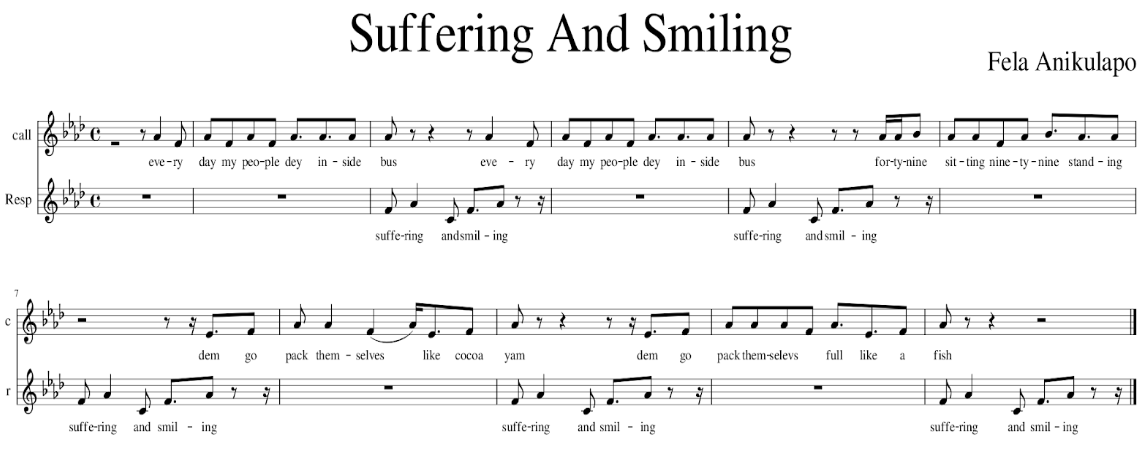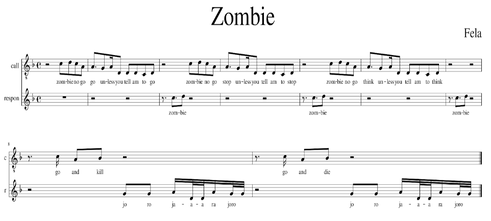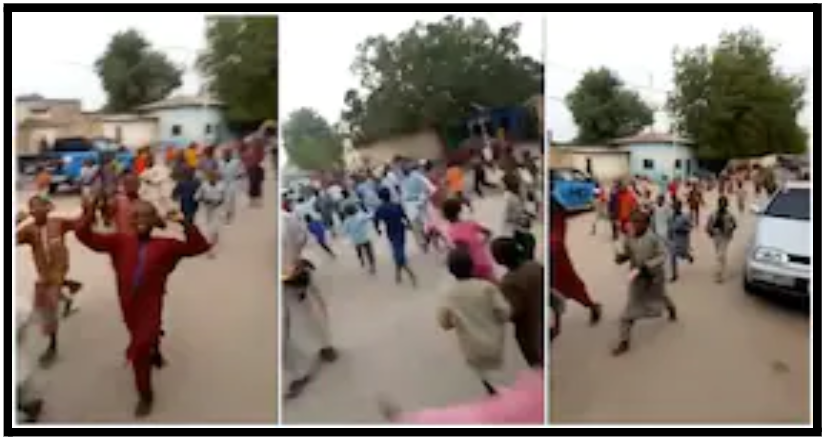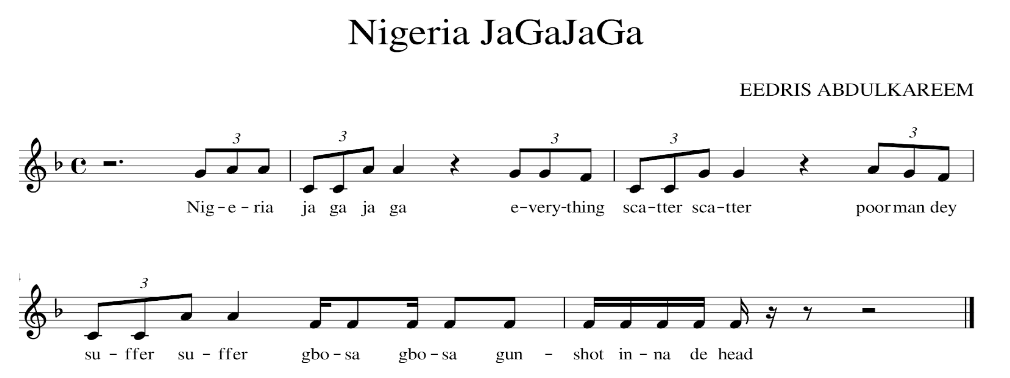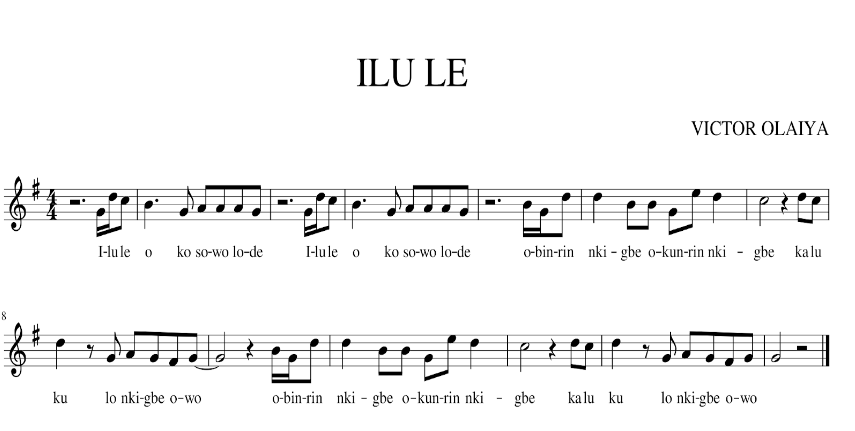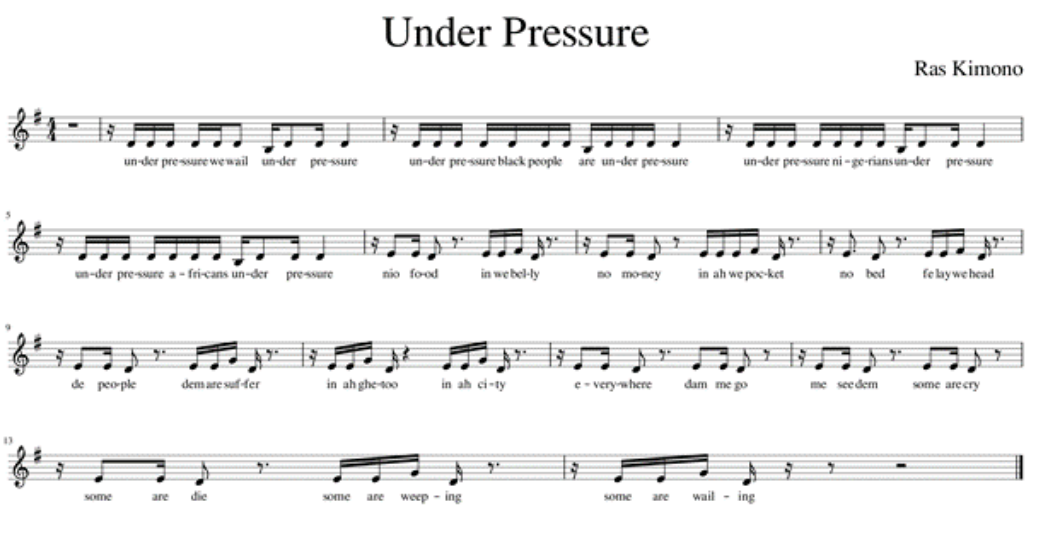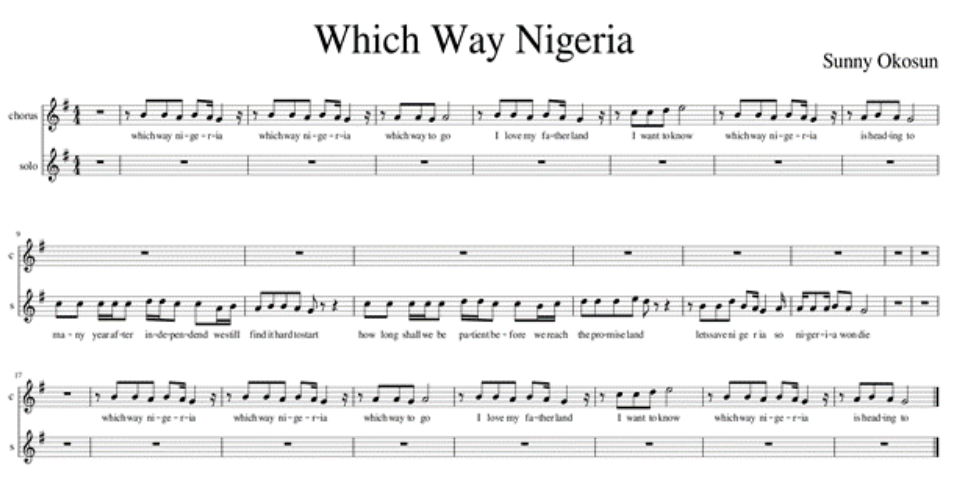UDC: 78.036(669.1)
316.4(669.1)
COBISS.SR-ID 109621769
_________________
Received: Oct 28, 2022
Reviewed: Nov 03, 2022
Accepted: Dec 05, 2022
Musical Sound Advocacy as Remedy for Institutional Decay in Nigeria
Olatunbosun Samuel Adekogbe
Department of Music, Obafemi Awolowo University, Ile-ife, Nigeria.
[email protected]
Department of Music, Obafemi Awolowo University, Ile-ife, Nigeria.
[email protected]
|
Citation: Adekogbe, S. Olatunbosun. 2023. "Musical Sound Advocacy as Remedy for Institutional Decay in Nigeria." Accelerando: Belgrade Journal of Music and Dance 8:6
Acknowledgement: I acknowledge the Nigerian copyright commission for the grant of access to all the musical discographies used for this study.
|
Abstract
In many world cultures, the place of music cannot be underestimated. Music has been used in diverse ways to correct, build, inform and educate people in all communities. Nigeria, as a nation, is not left out of these practices. This paper questions why the Nigerian government has failed in institutional responsibility? Why has the nation been experiencing an institutional decay in the provision of basic needs for her citizens even with the application of musical advocacies by many Nigerian popular music artistes in this regard? This paper, therefore, examines musical advocacies of selected popular music artists in Nigeria; Fela Anikulapo Kuti “Zombie”, “suffering and smiling”, Edrees Abdu Kareem “Nigeria Jàgà Jágá”, Sonny Okosun “which way Nigeria”, Victor Olaiya “Ìlú Le”, and Ras Kimono “Nigeria Under Pressure”, using in-depth analysis of the songs’ lyrics in connection with the recent socio-economic situation in Nigeria. Behavioral theory of leadership by Rensis Likert (1938) is adopted as a theoretical framework. Findings show that the selected songs have been used as advocacies and a clarion call to signal the decadence of the Nigerian government as an institution in relation to the state of hunger and starvation ravaging the country. The paper further establishes that the regular youth protests through regular closure of Universities, general criminality of banditry and kidnapping have resulted from the institutional decay of the Nigerian government. The paper concludes that the Nigerian government has bluntly ignored these musical sound advocacies on institutional decay to avert the outburst of bottled bitterness as expressed in protests, banditry, looting of both public and private property and especially, daily loss of lives of many Nigerians. This paper recommends that more musical advocacies be intensified to shape governance, not only at the federal level but also at the states and local government authorities.
Keywords: institutional decay, musical sound advocacy, behavioral theory of leadership, Nigerian popular musicians, analysis of the songs |
Introduction
The Nigerian government as an institution, has basic obligations to provide for all the needs for its citizens in order to live a good life and not to survive. Going by the current trends of economic, social, political and religious activities, there is no better way to describe the Nigerian government as an institution than that of a decayed one. Administration as an element of solid foundations, is a pre-essential for improving financial execution on a continued premise. While the issue of fortifying the institutional structure is regularly featured, its result is sliding down without any improvement. Innumerable signs show the dissolving of administration even on the standard issues of monetary mismanagement which has saturated the Nigerian institutional framework. It is on this premise that this paper discusses the musical advocacy of selected popular music artistes for a better Nigeria and a country where every citizen has the fundamental right to live a life and not to endure a living.
For instance, the Nigeria government has basically neglected its responsibilities on certain fundamental necessities of life such as provision of potable water, clothing, employment, good housing scheme, security of life and property for its citizens. In this way, the current institutional disappointment in Nigeria has made an average Nigerian to be totally reliant on a casual economy which has offered approaches to a wide range of human misbehaviors such as fraud, criminality in forms of herdsmen attack and killing, rape of young and old, kidnapping of various degrees at various levels, bugling of houses and malls, even government property is not spared in this criminality. Yet many Nigerians, on the pretext of endurance, could not voice out these displeasures that have resulted from institutional decay. In spite of the advocacy and appeasement by popular music artists from the eighteenth century to date, there has been no improvement on the side of the government to establish good administrative processes in Nigeria. The objective of this paper, therefore, is to look at the musical advocacy of selected popular musicians like Fela Anikulapo Kuti’s "Zombie" and "Suffering and Smiling", Edrees Abdu Kareem’s "Nigeria Jàgà Jágá", Sonny Okosun’s "Which Way Nigeria", and Ras Kimono’s "Nigeria Under Pressure" using an in-depth analysis of the songs’ lyrics. In addition, it encompasses an opinion survey of their listeners to establish the level of musical sound advocacy being put forward to attain good institutional functions in Nigeria. Defining Popular Music
Popular music by conceptual definition, is a generally acceptable musical type of various genres within a defined language and culture. Popular music, according to Njoora (2015, 28) is inseparable from human daily activities. The concern of popular music has been basically for entertainment purposes where music performances are defined for praise singing of the riches, although, Merriam (1964) categorizes the functions of popular music into ten (10) but, fails to mention advocacy role in all the strong cases presented in the multiple roles of music in African lives and the community in general. The paradigm shift in recent performance scopes has put popular music artists as advocates for the less privileged and checks and balances to the ills in the society especially, to check government institutions from running out of administrative focus. Renowned musicians like Fela Anikulapo Kuti, Edrees Abdu Kareem, Sonny Okosun, Victor Olaiya and Ras Kimono have applied popular music as an advocacy to institutional decay in Nigeria.
Behavioral Theory of leadership and the Application of Musical Sound Advocacies
Behavioral theory of leadership by Rensis Likert (1938) contends that the achievements of a leader depend on behavioral responses to issues rather than inactiveness. Behavioral leadership theory includes noticing and assessing a leader’s actions and reactions to national pressing issues in a specific situation. This theory adopts that leaders are made and not conceived. Advocates of this theory recommend that anybody can turn into a good leader if he or she can conceive and implement specific ways of behavior. There are several instances where music has been used to correct and reshape human behaviors, especially in the melodic expressions “which are used for transforming ordinary experience into deeper personal/collective responsibilities” (Njoora 2015, 27). Also, Francis (2008) argues that
Music is a very powerful medium and in some societies there have been attempts to control its use. It is powerful at the level of the social group because it facilitates communication which goes beyond words, enables meanings to be shared, and promotes the development and maintenance of individual, group, cultural and national identities. It is powerful at the individual level because it can induce multiple responses – physiological, movement, mood, emotional, cognitive and behavioral. Few other stimuli have effects on such a wide range of human functions. The brain’s multiple processing of music can make it difficult to predict the particular effects of any piece of music on any individual.” (ibid, 4.) Construing this paper on musical advocacy for good governance, most Nigerian popular musicians have made their voices known to but not heard by the Nigerian government on the need to attend to some salient social and economic issues affecting the lives of the citizens. Such artistes include Fela Anikulapo Kuti “Sorrow, Tears and Blood”, “suffering and smiling”, Edrees Abdu Kareem ``Nigeria Jàgà Jágá”, Sonny Okosun “which way Nigeria”, Victor Olaiya “Ilu Le”, and Ras Kimono “Under Pressure”. These selected popular music artists' songs are within the scope of this paper. Apparently in order to make an all-inclusive behavioral process through musical activities, the Nigerian national educational curriculum places an emphasis on music education from nursery schools to secondary education. Accordingly, it is a brilliant avenue to teach morals and inculcate values of good behavior in every Nigerian. The end result is still the traits of corrupt practices and self-centeredness of the Nigerian leadership behaviour. Government as an Institution:
|
|
|
Lead: Everyday my people day inside bus
Response: Suffering and smiling Lead: Forty-nine sitting, ninety-nine standing Response: Suffering and smiling Lead: Dem go pack themselves like cocoyam Response: Suffering and smiling Lead: Every day, na the same thing Response: Suffering and smiling |
Recalling from Akinrinade (2016, 13), at the Professor Kenneth Dike memorial lecture delivered at the 2016 congress of the historical society of Nigeria, University of Port Harcourt, opines that “the Nigerian society is under pressure" aptly describes the state of anomy that pervades the geographical spaces that were brought together into the Nigerian State but mismanaged by the leadership and followership. In other words, the submission here is that the state of “under pressure” in Nigeria is caused by all Nigerians. Moreover, Fela Anikulapo also expresses his concern on the pressured status of Nigerians especially in the area of good public transportation systems. Fela sings about the compressed sitting arrangements of commuters in public buses in the Lagos environment, a situation where people struggle for buses and the overloading condition of such public buses. Fela sings “suffering and smiling” as a satire of the deplorable transportation system in Nigeria.
Musical Advocacy on Military and Police Brutality: “Zombie”
Fela’s determination to denounce the military and police brutality, abuse of power, endemic corruption, bad governance and its associated dysfunctions establishes the theme of his song to condemn the decaying status of the Nigerian institutions. Fela’s song is a perfect illustration of the military and police brutality still occurring today in Nigeria. Connecting this song to other Fela’s songs in condemning the intolerance attitudes of police brutality, Fela, in 1976 released “Zombie”, a scathing antimilitarist satire. This song is a mockery of the Nigerian army and its stereotyped robot-soldiers’ nature. Fela expresses the Nigerian Army as a set of people who could not reason on their own but blindly take orders from the superiors. Fela’s figurative expression is presented in the song lyrics as follows (interpretation is in the brackets):
Lyrics
Lead: Zombie no go go, unless you tell am to go (Soldier won’t go without order)
Res: Zombie (Solider)
Lead: Zombie no go stop, unless you tell am to stop (Soldier won’t go without order)
Res: Zombie (Solider)
Lead: Zombie no go think, unless you tell am to think (Soldier won’t go without order)
Res: Zombie (Solider)
Lead: Go and kill (Go and kill)
Res: Joro jaara Joro
Lead: Go and die (Go and die)
Res: Joro jaara Joro
Lead: Zombie no go go, unless you tell am to go (Soldier won’t go without order)
Res: Zombie (Solider)
Lead: Zombie no go stop, unless you tell am to stop (Soldier won’t go without order)
Res: Zombie (Solider)
Lead: Zombie no go think, unless you tell am to think (Soldier won’t go without order)
Res: Zombie (Solider)
Lead: Go and kill (Go and kill)
Res: Joro jaara Joro
Lead: Go and die (Go and die)
Res: Joro jaara Joro
|
Over a period of time in Nigeria, citizens have had bitter experiences of military and police brutality, from unlawful arrest to unlawful detention, prosecution and imprisonment. Recently, the October 2020 national youth protest tagged #EndSars came as a result of incessant police brutality on peaceful and law-abiding Nigerian citizens, especially the Nigerian youths, is complete reflection of total institutional decadence in Nigeria. Opening fire on peaceful protesters is a blatant violation of people’s rights to life, dignity, freedom of expression and peaceful assembly. Soldiers clearly had one intention, that is, to kill without consequences. Reporting on the incident, Amnesty International has been monitoring developments across Nigeria since the #EndSars protest began on 8 October 2020. At least 56 people died across the country during the protest, with about 38 killed on Tuesday, October 20, 2020 alone (www.punchonline.com). According to Punch Online Newspaper of 24 November 2020, “victims include protesters and thugs who were allegedly hired by the authorities to confront the protesters.” In many cases, the security forces had used excessive force in an attempt to control or stop the protests. The killings of the Nigerian youths are a confirmation of Fela’s position in his song that military and police brutality always “leave sorrow, tears and blood as a regular trademark.” Collecting from Fela’s dong lyrics that
[interpretation is in the brackets]
Lyrics
Everybody run, run, run (Everybody is running) Everybody scatter, scatter (Everybody is scattered) Some people lost some bread (Some people lost some bread) Someone nearly die (Someone nearly die) Someone just died (Someone just died.) Police they come, army they come (Police they come, army they come) Confusion everywhere (Confusion everywhere)
The above lyrics suggest a state of total confusion and upheaval where less-defensed individuals are exposed to serious danger and possible death.
Musical Advocacy on Lack of Potable Water and Electricity:
|
References
|
This website is under Attribution-NonCommercial-NoDerivatives 4.0 International (CC BY-NC-ND 4.0)
Belgrade Center for Music and Dance is the publisher of Accelerando: BJMD
Belgrade Center for Music and Dance is the publisher of Accelerando: BJMD


